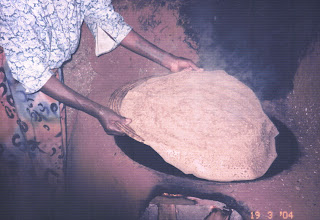Meheret 's mom making "Injera" which is part of their daily food along what they can afford - vegetables such as cabbage ("gomen"), potatoes ("dinich"), and swiss chard ("costa"), and pure of ground dried orange or brown peas, which they called "shiro". Injera is a staple in Ethiopia. It is like a big, thin pancake made out of fermented teff flour. When eating, people will break off a piece of injera and use it to pick up the vegetables and "shiro" with their fingers, instead of using utensils.
Here she starts the fire with eucalyptus wood. Right upper corner: Wiping the clay cooking surface with cloth. Scooping the fermented teff flour to place on the clay cooking surface.
The injera is then picked up and placed in a straw basket. Injera, vegetables, and "shiro" make up the basic diet for many Ethiopians.
Bersabeh & Shiferaw's Ethiopian wedding. Sadly, within a few years Bersabeh would succumb to breast cancer - yet another example of the harsh reality of life in Africa. You may see them "dressed up", but the reality of Africa is still there. Dressing up does not change that.
This is our first time attending a stunning and colorful Ethiopian wedding.

Living at Yerer
... Maazi comes over often and helps do my dishes in kitchen of someone where we stayed in 2007 after trip to Namibia. Yerer is one of the neighborhoods adjacent to Addis proper.

On a rainy day, they even have the clothes out to dry...hum... You can see the corrugated-tin-sheet kitchen within the compound, cement block wall/ fence, and the gate.
Photo below - on the left is their dining room or extra room to have their meal and their shower/toilet in the middle of photo. Their kitchen is to the right. Their helper, Habtam, preparing the spices looks like ('bere bere', garlic, red onion and ginger) which will be used for cooking shiro, etc.. They like a lot of spices! Many Ethiopians have domestic servants. They work very hard, and will try to further their meager education by attending night classes. Their life is difficult. Besides food and lodging, they were paid but a pittance for their services - maybe somewhere between 50 to 100 birr ($6 to $12) PER MONTH!
Maazi and Helena visit us for my birthday in April 2007
More visitors...Meheret (Mercy) on the left, and Guenet.
Ethiopia is one of the poorest countries in the world. Yet it is not because there is not wealth, resources, and beauty in Ethiopia, or other countries of Africa for that matter either. Since Ethiopia, one of the oldest countries in the world, was never really colonized (briefly occupied by Italy), it is a prime example of what is really happening in Africa. Poverty is not the "problem" of America, but is rather the "RESULT OF THE PROBLEMS" in Africa. When the real problems are not addressed therefore, the poverty persists. Thus, one finds opulent luxury next to devastating poverty.
As the Lord indicated to us: "There are too many poor women and children (in Ethiopia). There are too many (of them) for (us). And there are TOO MANY WHO DON'T CARE !"

















No comments:
Post a Comment